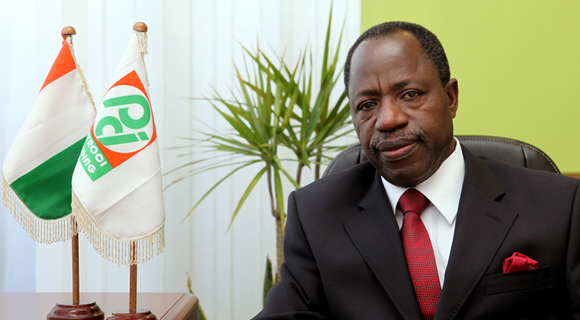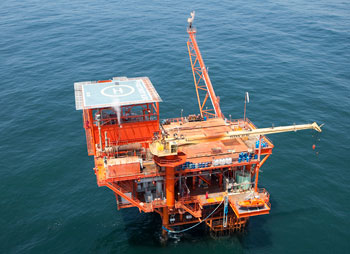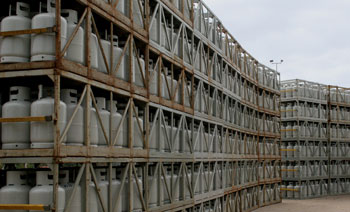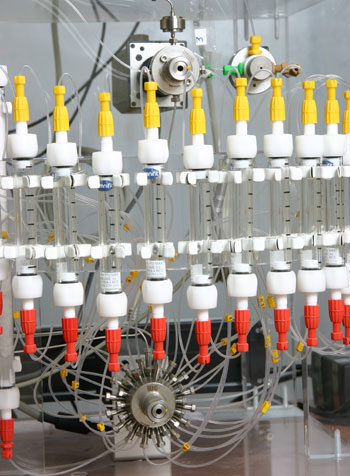Petroci Côte d’Ivoire
Daniel Gnangni, General Director of Petroci Côte d’Ivoire
Petroci Côte d’Ivoire is the national oil company of Côte d’Ivoire and thus represents the Côte d’Ivoire oil sector. For the close future, Petroci intends to intensify exploration to significantly increase production and also to take steps to promote new discoveries.
Interview with Daniel Gnangni, General Director of Petroci Côte d’Ivoire

In your opinion, what are the major challenges for Côte d’Ivoire today?
After the long and painful crisis that we have recently been through, the great challenges facing Côte d’Ivoire are quite diverse. First and foremost, we have to succeed in reconciling the hearts and minds of Ivorians and teaching the people how to live together. We must then quickly succeed in ensuring individual and material security throughout the country. We must also tackle the task of repairing the great amount of damages that the crisis has caused. Finally, we need to work on creating a business friendly environment for the revival of activities.
How do you evaluate the oil and gas sector in Côte d’Ivoire? Also, what role does this sector play in the Ivorian economy?

As of now, Côte d’Ivoire is not a major oil-producing country. Our current production is of around 35,000 barrels of crude oil and 130,000,000 cubic feet of natural gas per day. This low performance level can partly be explained by the natural depletion of existing oil fields, technical difficulties encountered in certain oil fields and finally, by the lack of new discoveries in the past many years.
To this day, only 30% of our sedimentary basin has been explored. Most of the exploited fields are located at a depth of less than 200m. The largest part of the basin that remains unexplored is situated in deep sea waters. The government’s ambition is to rapidly attain production levels of 200,000 oil barrels and 300,000,000 cubic feet of gas per day by intensifying exploration activities.
When we reach those production levels, be it on the middle or short term, we will have sufficient resources to allow the oil sector in Côte d’Ivoire to substantially increase its contribution to Côte d’Ivoire’s national budget.
However, we must call to attention that around 70% of our electricity is produced by natural gases that are extracted from the ground. In addition, supplying some local industries with natural gases, in the best conditions and continuously, contributes to reducing their electricity bills and to increasing their competitiveness.
What strategy do you think can make a major oil-producing country out of Côte d’Ivoire?
…we have both a technical role, that of ensuring the prevalence of Côte d’Ivoire in petroleum products, and a social role, that of participating in the development of the people of Côte d’Ivoire.
It is true that Côte d’Ivoire is still a small oil producer, but the greatest part of our sedimentary basin – in which we put our hopes of making big discoveries, with reason – has yet to be explored. For one, it consists of the deep offshore region.
In order to find oil, exploration drilling needs to be carried out. Petroci has only done five in the last ten years, which of course does not help our chances of finding anything.
The strategy to make a major producer out of Côte d’Ivoire is quite simple. We need to continue promoting our sedimentary basin in an even more aggressive manner, in order to attract oil companies, the major ones in particular. We need to tell them about the enormous potentialities that this basin offers. In that regard, we do not think that nature can skip and put us at a disadvantage, after abundantly filling neighboring basins with hydrocarbons.
We must only keep in mind companies that have proven technical capacity and a substantial financial surface, and that accept to carry out an exploration program that has the potential to increase our chances of discovering new fields. In order to locate what we call stratigraphic traps – deep sea waters in which hydrocarbons accumulate, most of the time –, one needs to have good knowledge of our basin’s geological environment and accordingly, be able to elaborate appropriate exploration strategies.

Do you see a lot of room for foreign investors in Petroci projects?
Concerning oil prospecting, only 19 out of the 49 blocks in our basin have been allocated with respect to production-sharing contracts. There are still 30 blocks that have yet to be distributed, including 6 that are onshore and 24 that are offshore. What this means is that there is a lot of room for foreign investors in the oil exploration sector of Côte d’Ivoire.
As for other projects in the oil industry, about a few dozens were identified in June by the minister of Mines, Oil and Energy, during an organized seminary. The complete list, as well as the true nature of those projects, will soon be made public for the oil industry and international investors to take note of and to show their interest to participate in their application.
How do you address the role of Petroci in the promotion of Côte d’Ivoire’s image? And how do you see its social responsibility?
Petroci is one of the major companies in Côte d’Ivoire. It is a form of support to the nation in the promotion of its image outside of the country, in many ways, namely the quality of the participation of its representatives in international forums, its ability to create partnerships with big technical, commercial and financial groups and to respect its undertakings with regards to its partners, and finally, Petroci’s ability to work in accordance with effective international norms in its industry sector.
Petroci has a social responsibility in the sense that it participates in the development of the Ivorian population throughout the projects that it initiates. Most of those Petroci projects aim to offer Ivorians products that are easily accessible at the lowest costs. Some of those projects create direct or indirect jobs via subcontractors, and they generally come with investments of public use in the sectors where they are carried out (construction of schools, free health centers, rural tracks, drilling of drinking water, etc.).
What is your strategic view of Petroci in a long term horizon? How about Côte d’Ivoire?

Petroci’s strategic view revolves around the following actions:
Exploration and production: Petorci needs to continue the promotion of the sedimentary basin in order to attract major oil companies in Côte d’Ivoire. Petroci needs to intensify exploration so as to significantly increase production, and Petroci also needs to take the necessary measures that will allow to rapidly develop the recent discoveries;
Marketing of our oil products: Petroci needs to increase storage capacities so that we can bring that product to consumers and meet the complete needs of the country in that aspect. We need to acquire the appropriate logistic means, particularly for marine transport of oil products. Petroci needs to extend the network and consolidate the managing of gas stations.
Infrastructures: We need to extend and make our natural gas distribution network denser, as well as build new storage terminals, not only in Abidjan but also elsewhere inside the country. We need to make them profitable for marketers in the region. Also, we need to finish building the multiproduct pipeline that goes from Abidjan to Bouaké, and to prolong it all the way to the border countries to the North of Côte d’Ivoire.
The unfortunate post-electoral crisis in Côte d’Ivoire is now in the past and so is the long and painful period of stagnation that had almost knocked it off the cliff. Slowly but surely, the country is getting back to normal and progressively starting to retrieve the position that used to be its own in the blending of nations. Soon, we will stop tending to our wounds and will consolidate our role as a leader of the sub-regional economy. We wish to tell our friends that we are back and that our country remains a welcoming one. Everything is getting back in order to make investors feel at ease and to ensure that each and every person who comes to visit us will find an appropriate and friendly business framework that will allow them to leverage a maximum of advantages throughout the relationships and partnerships that they will create with Côte d’Ivoire.